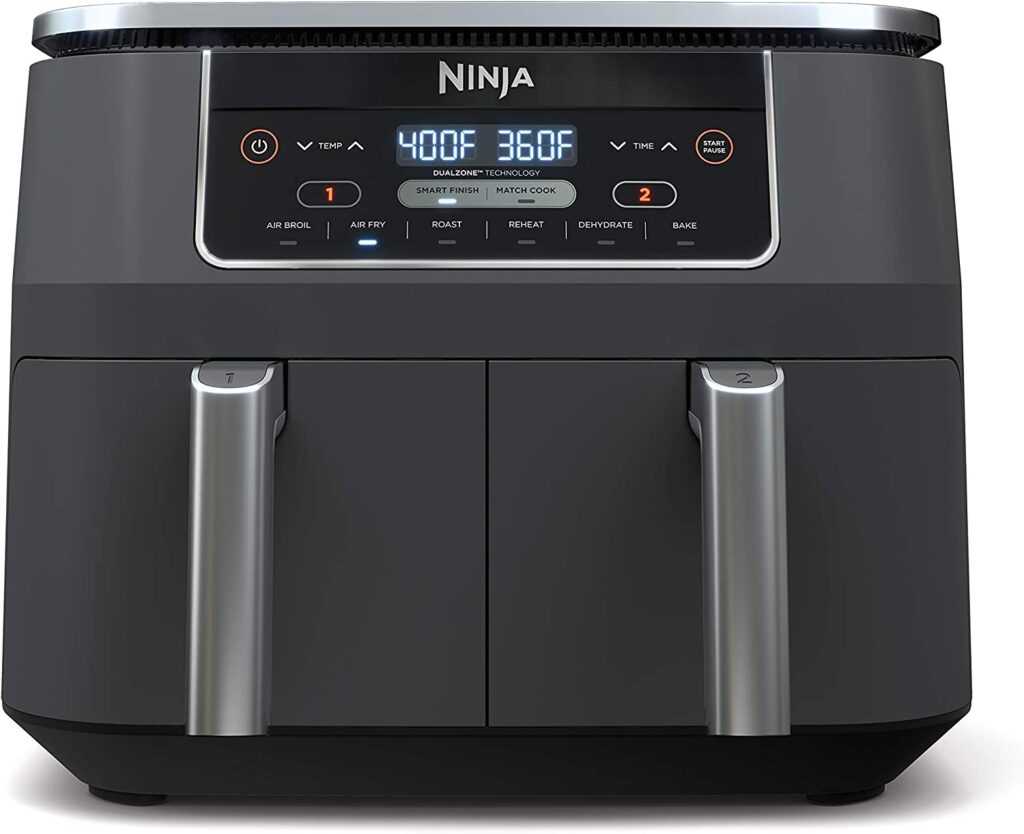Rack Of Ribs Air Fryer Recipe : A Comprehensive Guide
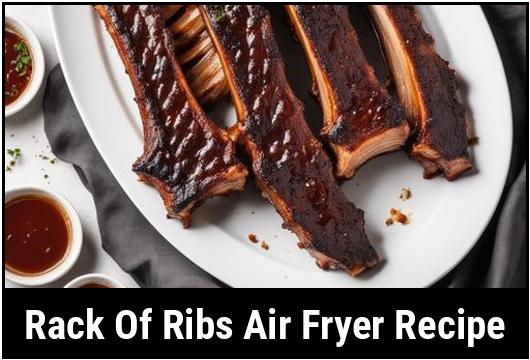
When it comes to preparing a succulent and flavorful rack of ribs, the air fryer is undoubtedly a game-changer. This convenient kitchen appliance allows you to achieve that perfect combination of tender meat with a crispy, caramelized exterior, all without the need for excessive oil or lengthy cooking times. In this comprehensive article, we will delve into the world of rack of ribs air fryer recipes, exploring the food science behind this cooking technique, sharing culinary details, and providing you with all the necessary information to master this mouthwatering dish.
Understanding the Science Behind Air Frying Ribs
Before we dive into the details of selecting, cleaning, and prepping your rack of ribs, it’s important to understand the science behind air frying. Air fryers work by rapidly circulating hot air around the food, creating the effect of deep frying without the need for excessive oil. This rapid circulation ensures even cooking and helps to achieve a perfectly crispy exterior. When it comes to ribs, this method is especially effective as it helps render the fat and create a delightful texture.
Selecting the Perfect Rack of Ribs
Selecting the right rack of ribs is essential in making sure your dish turns out tender and flavorful. When choosing ribs, you have two primary options: baby back ribs and spare ribs.
Baby Back Ribs
Baby back ribs are smaller, leaner, and typically more tender than spare ribs. They are cut from the upper rib area of the pig, closer to the loin, which explains their tenderness. Baby back ribs are a great choice if you prefer a more delicate and less fatty cut.
Spare Ribs
On the other hand, spare ribs are larger and contain more fat, which gives them a rich and flavorful taste. They are cut from the belly area of the pig and have a meaty texture. Spare ribs are ideal if you enjoy a more substantial and indulgent rib-eating experience.
Ultimately, the choice between baby back ribs and spare ribs depends on personal preference. Whichever type you choose, ensure that the ribs are fresh, of high quality, and have a good amount of meat on them.
Cleaning and Preparing the Ribs
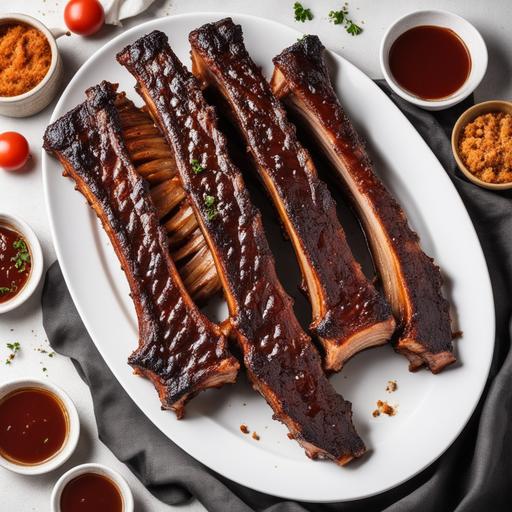
Once you’ve chosen your ideal rack of ribs, it’s time to prepare them for cooking. Proper cleaning and preparation are crucial steps in achieving a delicious outcome.
Cleaning the Ribs
Start by rinsing the ribs under cool water to remove any bone fragments or debris. Pat them dry with paper towels, making sure all excess moisture is removed. This step is essential as it helps to ensure even cooking and enhanced caramelization.
Removing the Membrane
The membrane, a thin layer of connective tissue on the bone side of the ribs, can obstruct the absorption of flavors and affect the texture of the final dish. It’s advisable to remove this membrane before cooking.
To remove the membrane, gently slide a butter knife under the membrane on one end of the rack, then grasp it with a paper towel and slowly peel it off in one piece. This process may take a bit of patience, but it greatly contributes to the tenderness of the ribs.
Seasoning Your Ribs
Now that your ribs are clean and ready, it’s time to add flavor. The seasoning profile you choose depends on personal taste preferences, but a classic blend of salt, black pepper, garlic powder, and paprika works wonders.
Generously rub the seasoning mixture onto both sides of the ribs, ensuring that every inch is covered. For an extra layer of flavor, let the seasoned ribs sit in the refrigerator for at least an hour, allowing the flavors to penetrate the meat.
Tips for Air Frying Ribs
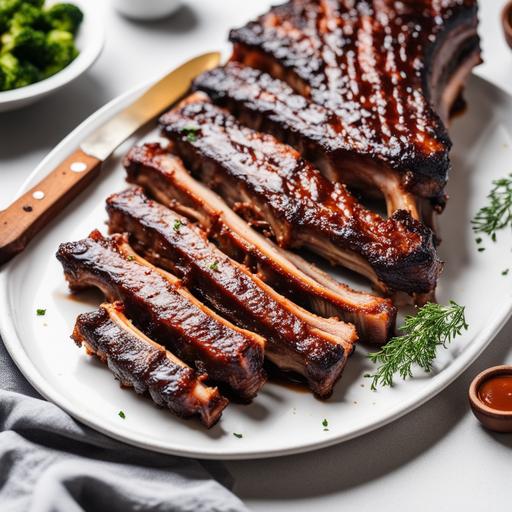
To guarantee that your ribs are cooked to perfection, here are some valuable tips to keep in mind:
Preheating the Air Fryer
Preheating is a crucial step that allows the air fryer to reach the desired cooking temperature before placing the ribs inside. This ensures even and consistent cooking throughout.
Preheat your air fryer to 375°F (190°C) for about 5 minutes before cooking the ribs. This initial blast of heat helps seal in the flavors and promotes a crispy exterior.
Placing the Ribs in the Air Fryer
Properly positioning the ribs inside the air fryer is essential for even cooking. Avoid overcrowding the basket to allow for proper airflow, which promotes thorough cooking and a crispy texture.
If your air fryer has a large enough capacity, you can cook a full rack of ribs at once. However, if needed, you can cut the rack into smaller portions to fit inside the fryer.
Basting and Flipping
Basting your ribs with your favorite barbecue sauce is a fantastic way to add flavor and moisture. After preheating and placing the ribs in the air fryer, baste them generously with your preferred sauce, ensuring an even coating.
During the cooking process, it’s crucial to flip the ribs once to promote even caramelization. When the halfway mark is reached, carefully flip the ribs using tongs, ensuring that the meat doesn’t stick to the basket.
Checking Doneness
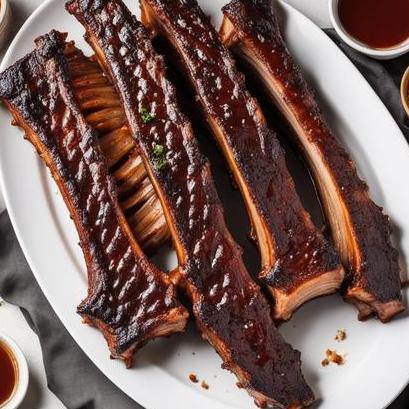
Determining the perfect level of doneness for your ribs is key to achieving a mouthwatering result. There are a few different methods for checking doneness:
Visual Indicators
One way to assess doneness is through visual cues. Well-cooked ribs will have a rich, golden-brown color with a caramelized crust. The meat should also pull away slightly from the bones.
Temperature Check
Using a meat thermometer can provide precise information about the internal temperature of the ribs. The USDA recommends that pork ribs reach an internal temperature of at least 145°F (63°C) to be considered safe for consumption.
Pierce the thickest part of the meat with a meat thermometer to ensure accurate readings. Remember to avoid touching the bone, as it can affect the temperature readings.
Bend Test
Another popular method to determine if the ribs are done is the bend test. Simply pick up the rack of ribs with a pair of tongs and gently bend them. Well-cooked ribs will have a slight give and should mostly hold together. If the meat falls apart or feels too firm, it may need more cooking time.
Mouthwatering Air Fryer Rack of Ribs Recipe
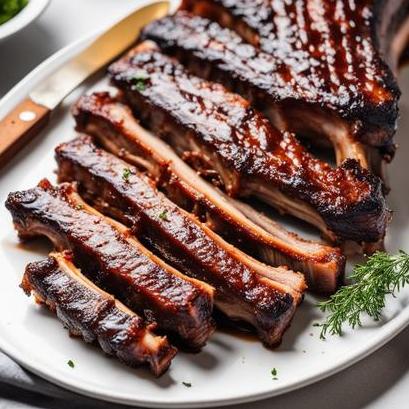
Finally, it’s time to put all the knowledge and tips into action with an irresistible air fryer rack of ribs recipe. Here’s a step-by-step guide to achieving tender, flavorful ribs that will leave your taste buds yearning for more:
Ingredients:
- 1 rack of baby back ribs or spare ribs
- 1 tablespoon of salt
- 1 tablespoon of black pepper
- 1 tablespoon of garlic powder
- 1 tablespoon of paprika
- Your favorite barbecue sauce
Instructions:
- Preheat your air fryer to 375°F (190°C) for approximately 5 minutes.
- Rinse the ribs under cool water and pat them dry with paper towels.
- Remove the membrane from the bone side of the ribs by sliding a butter knife underneath and peeling it off with a paper towel.
- In a bowl, combine the salt, black pepper, garlic powder, and paprika to create a flavorful rub.
- Generously season both sides of the ribs with the rub, ensuring even coverage.
- Optional: Let the seasoned ribs sit in the refrigerator for about an hour for enhanced flavor.
- Place the ribs in the preheated air fryer, ensuring they are not overcrowded.
- Cook the ribs for approximately 30-40 minutes, flipping them halfway through the cooking process.
- Baste the ribs with your favorite barbecue sauce, ensuring they are well-coated.
- Continue cooking for another 10-15 minutes until the ribs are caramelized and reach an internal temperature of at least 145°F (63°C).
- Remove the ribs from the air fryer and let them rest for a few minutes before serving.
- Slice the rack of ribs into individual servings, serve with additional barbecue sauce, and enjoy!
Variations and Personalization
While the aforementioned recipe provides a classic approach to air frying ribs, feel free to experiment and put your own spin on things. Consider trying the following variations to personalize your dish:
-
Dry Rub Variations: Explore different combinations of herbs and spices to create unique dry rubs. Adding cumin, chili powder, or herbs like rosemary and thyme can introduce exciting flavors.
-
Saucy Selections: Get creative with barbecue sauces by choosing different flavors and heat levels. From tangy and sweet to smoky and spicy, the sauce can significantly impact the overall taste.
-
Marinating Method: Instead of solely relying on dry rubs, consider marinating your ribs overnight or for a few hours before air frying. Experiment with marinades that include citrus, soy sauce, or even beer to infuse additional flavors.
Cleaning and Maintenance
To ensure your air fryer remains in optimal condition, proper cleaning and maintenance are crucial. While the specific cleaning instructions may vary depending on your air fryer model, here are some general guidelines to follow:
- Always unplug your air fryer and allow it to cool completely before cleaning.
- Remove any excess oil or food particles from the air fryer basket.
- Wash the basket and any removable trays in warm, soapy water. Use a sponge or non-abrasive brush to remove stubborn residue.
- Wipe the interior and exterior of the air fryer with a damp cloth or sponge. Avoid using harsh chemicals or abrasive materials that could damage the appliance.
- For more thorough cleaning, consult the manufacturer’s instructions specific to your air fryer model.
Proper maintenance and regular cleaning not only ensure the longevity of your air fryer but also help maintain the quality and taste of your cooked dishes.
Conclusion
Congratulations! You have now become well-versed in the art of air frying rack of ribs. Armed with an understanding of the science behind air frying, tips for selection, cleaning, preparation, and a mouthwatering recipe, you are ready to embark on a culinary adventure and create delicious ribs that will leave your friends and family in awe.
Remember to experiment with different seasonings, sauces, and cooking times to find your perfect balance. With the versatility and convenience of the air fryer, you can easily indulge in restaurant-quality ribs from the comfort of your own kitchen. Enjoy your flavorful creations and savor each bite!
Sources
FAQS On Rack Of Ribs Air Fryer Recipe
Can I Use Any Kind Of Ribs For This Air Fryer Recipe?
Yes, you can use any type of ribs such as pork, beef, or even baby back ribs.
How Long Should I Cook The Ribs In The Air Fryer?
It typically takes around 25-30 minutes to cook ribs in the air fryer, but it may vary depending on the thickness of the ribs.
Do I Need To Preheat The Air Fryer Before Cooking The Ribs?
Yes, preheating the air fryer to 400°F will ensure even cooking and a crispy exterior on the ribs.
What Temperature Should The Internal Temperature Of The Ribs Reach?
The internal temperature should reach at least 145°F for food safety. However, many people prefer to cook ribs until they reach an internal temperature of 165°F for a more tender and juicy texture.
Do I Need To Marinate The Ribs Before Cooking In The Air Fryer?
It is recommended to marinate the ribs for at least 2 hours or overnight for maximum flavor. However, if you are short on time, you can skip the marinating step and still achieve delicious ribs.
Can I Add BBQ Sauce To The Ribs While Cooking In The Air Fryer?
Yes, you can add BBQ sauce to the ribs during the last 5 minutes of cooking for a flavorful and sticky glaze.
How Do I Prevent The Air Fryer From Smoking While Cooking The Ribs?
To prevent the air fryer from smoking, be sure to trim off any excess fat from the ribs and use a minimal amount of oil (if any) in the marinade. You can also line the bottom of the air fryer basket with aluminum foil for easier cleanup and to catch any excess fat or drippings.

